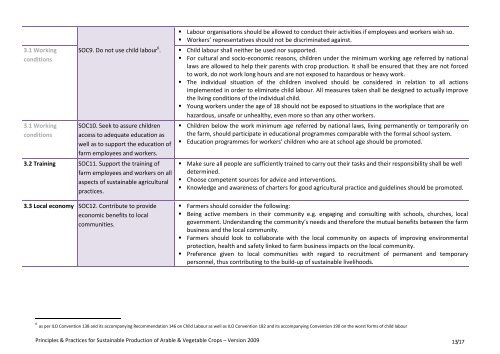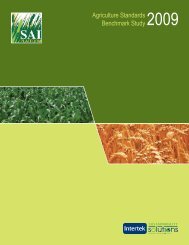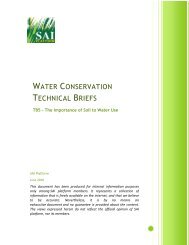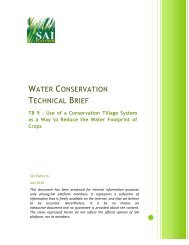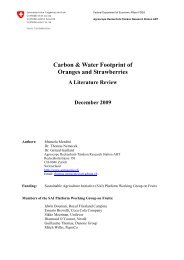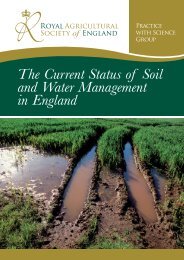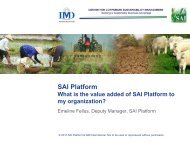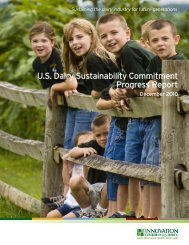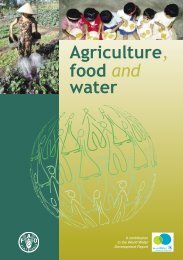Principles & Practices for Sustainable Production of ... - SAI Platform
Principles & Practices for Sustainable Production of ... - SAI Platform
Principles & Practices for Sustainable Production of ... - SAI Platform
Create successful ePaper yourself
Turn your PDF publications into a flip-book with our unique Google optimized e-Paper software.
3.1 Working<br />
conditions<br />
3.1 Working<br />
conditions<br />
SOC9. Do not use child labour 6 .<br />
SOC10. Seek to assure children<br />
access to adequate education as<br />
well as to support the education <strong>of</strong><br />
farm employees and workers.<br />
3.2 Training SOC11. Support the training <strong>of</strong><br />
farm employees and workers on all<br />
aspects <strong>of</strong> sustainable agricultural<br />
practices.<br />
3.3 Local economy SOC12. Contribute to provide<br />
economic benefits to local<br />
communities.<br />
• Labour organisations should be allowed to conduct their activities if employees and workers wish so.<br />
• Workers’ representatives should not be discriminated against.<br />
• Child labour shall neither be used nor supported.<br />
• For cultural and socio-economic reasons, children under the minimum working age referred by national<br />
laws are allowed to help their parents with crop production. It shall be ensured that they are not <strong>for</strong>ced<br />
to work, do not work long hours and are not exposed to hazardous or heavy work.<br />
• The individual situation <strong>of</strong> the children involved should be considered in relation to all actions<br />
implemented in order to eliminate child labour. All measures taken shall be designed to actually improve<br />
the living conditions <strong>of</strong> the individual child.<br />
• Young workers under the age <strong>of</strong> 18 should not be exposed to situations in the workplace that are<br />
hazardous, unsafe or unhealthy, even more so than any other workers.<br />
• Children below the work minimum age referred by national laws, living permanently or temporarily on<br />
the farm, should participate in educational programmes comparable with the <strong>for</strong>mal school system.<br />
• Education programmes <strong>for</strong> workers’ children who are at school age should be promoted.<br />
• Make sure all people are sufficiently trained to carry out their tasks and their responsibility shall be well<br />
determined.<br />
• Choose competent sources <strong>for</strong> advice and interventions.<br />
• Knowledge and awareness <strong>of</strong> charters <strong>for</strong> good agricultural practice and guidelines should be promoted.<br />
• Farmers should consider the following:<br />
• Being active members in their community e.g. engaging and consulting with schools, churches, local<br />
government. Understanding the community’s needs and there<strong>for</strong>e the mutual benefits between the farm<br />
business and the local community.<br />
• Farmers should look to collaborate with the local community on aspects <strong>of</strong> improving environmental<br />
protection, health and safety linked to farm business impacts on the local community.<br />
• Preference given to local communities with regard to recruitment <strong>of</strong> permanent and temporary<br />
personnel, thus contributing to the build-up <strong>of</strong> sustainable livelihoods.<br />
6 as per ILO Convention 138 and its accompanying Recommendation 146 on Child Labour as well as ILO Convention 182 and its accompanying Convention 190 on the worst <strong>for</strong>ms <strong>of</strong> child labour<br />
<strong>Principles</strong> & <strong>Practices</strong> <strong>for</strong> <strong>Sustainable</strong> <strong>Production</strong> <strong>of</strong> Arable & Vegetable Crops – Version 2009 13/17


